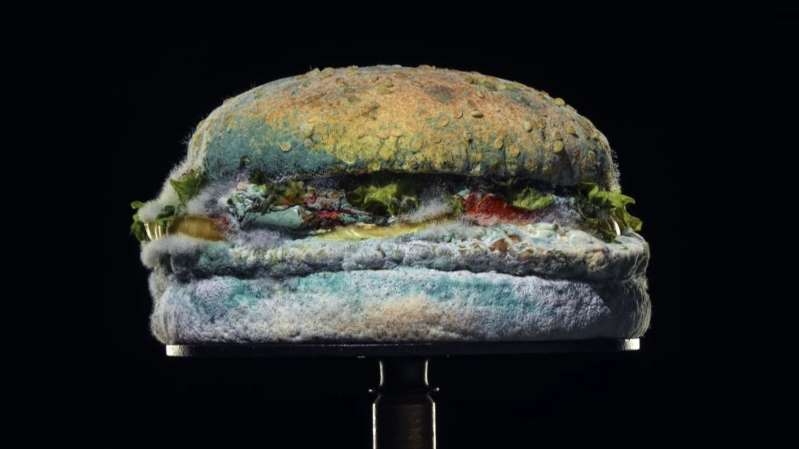Creativity in the time of Cholera.

I’ve never read that book. It looks a bit long. Is it long? I get it confused with À la recherche du temps perdu, which I’ve also managed not to read. I think that’s a real doorstep. I’m not averse to a doorstep (I’ve read War and Peace), but I do like to discover that a real classic is nice and slim (see Catcher in the Rye and The Prince for excellent examples).
Anyway, here we are in the time of cholera. Depending on your country of residence, a couple of weeks of shutdown have passed. People have told you this is the new normal enough times for it to be the new normal of the new normal. You might have more work to do, but you probably have less, and you might have none. So what to do with the free time that isn’t taken up by your one mandatory exercise hour and your weekly search for toilet paper?
I used to ECD an agency whose work came in quite distinct waves. Three or four times a year we’d be a month or two of all hands to the pump, followed by a month or two of pretty much nothing. One of my art directors asked me what he was supposed to do with all this free time. I was surprised at this question because I thought all creatives had a side thing (not ‘hustle’. Never hustle. That implies some sort of part-time job whose existence is made necessary by your relatively paltry wages and the fact that your day job offers no creative satisfaction. If that’s your thing, feel free to get hustling, then enter whatever you’re doing into D&AD’s fucking stupid ‘Side Hustle’ category, but know that winning that Pencil is about as admirable as drinking a pint of your own piss).
My side thing has always been other writing. I’ve had one novel published, but I’ve written a couple more, along with three screenplays and an entire 10-episode TV series. So when my department was in a fallow time, I always had somewhere to point my creativity.
Being an advertising creative is necessarily a job of peaks and troughs. Even if you have the best, trickiest, most fascinating brief on your desk, you need time away from it, time to allow your subconscious to come up with some solutions. Maybe you could take that mental holiday by going for a walk. I found another 500 words on my other thing was just as effective. At the end of the year I tended to have most of a book finished, and it kept my writing muscle in tip-top shape.
But here we are in the time of cholera, where you might be feeling a bit adrift. Should you be battering down the doors of recruiters? Maybe, but there’s less work out there, and only so many people to contact, so at some point you’re going to have to step away from LinkedIn and do something else.
What about recharging the batteries? Slam down Tiger King, or whatever movie you’ve always been meaning to watch. Read that biography of Elton John. Make the bestest-ever workout playlist for your iPhone.
But you’ll still have plenty of free time, and here’s the real kicker: it’s a gift you may never receive again (although I’m pretty sure we’re going to go through another pandemic in the next 5-10 years). Don’t let it go to waste.
Let me give you an example: I am a poor visual artist. My drawings haven’t really moved on from when I was about twelve, and they were pretty mediocre back then. But in November I had a brainwave inspired by listening to an excellent interview with Grayson Perry, a book written by Mark Denton, and a kind email from my former creative teammate Adam Tucker: my art was my writing. No artist has really used a lot of writing as their visual (feel free to correct me, but I have yet to find one. I think if you’re good as creating pictures you’re probably not so keen on writing shitloads of words), so if I wrote and wrote and wrote, those words might look good on a single canvas or sheet of paper.
I started with large A2-ish sheets, and experimented with different colours and patterns, then I established that a single block of black type looked best, so I added that to a T-shirt and a larger canvas:

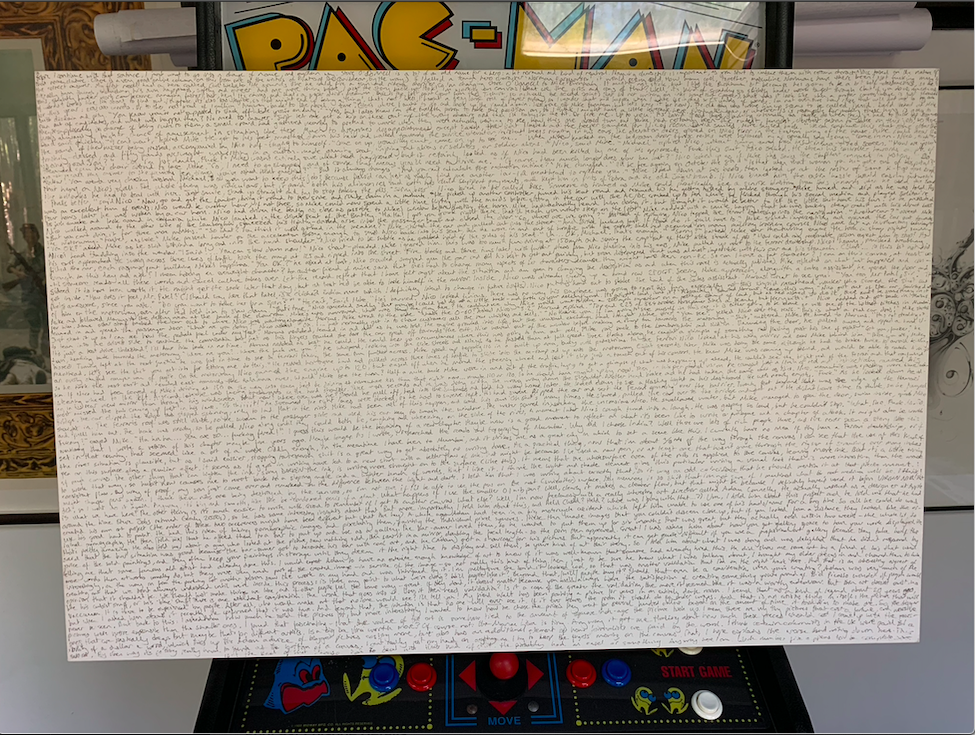
I liked the way they looked, so I took the next natural step and bought a roll of paper that’s 4 feet wide by 75 feet long. Yes, that is indeed 300 square feet. When I started it in late January I worked out that, at around 1000 words a day, it would take me until September to finish it.
As Percy once said in Blackadder 2, I like a challenge.
Every evening I knelt behind the couch as my family watched Schitt’s Creek, and added to the piece. By the end of February it looked like this:
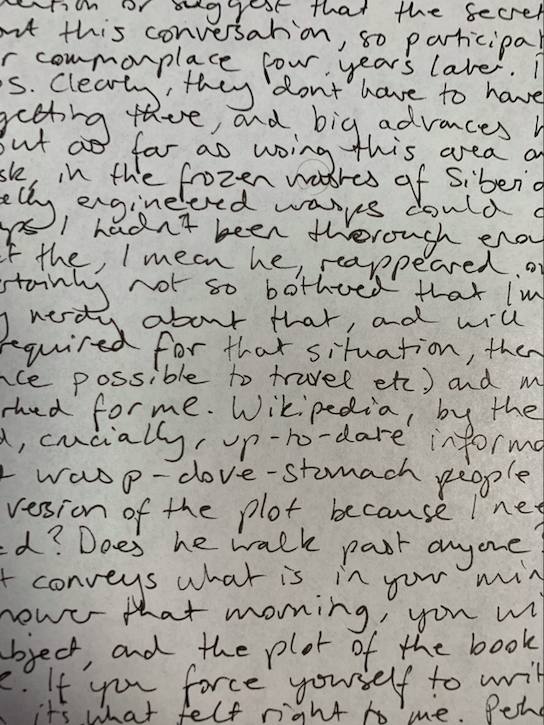
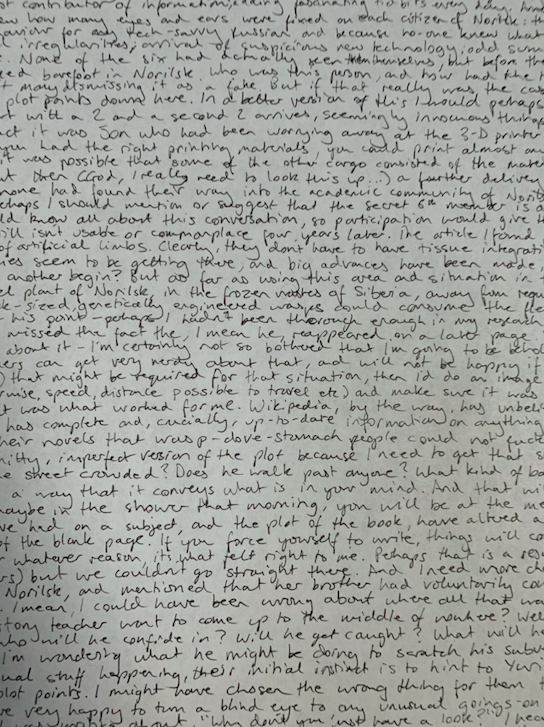

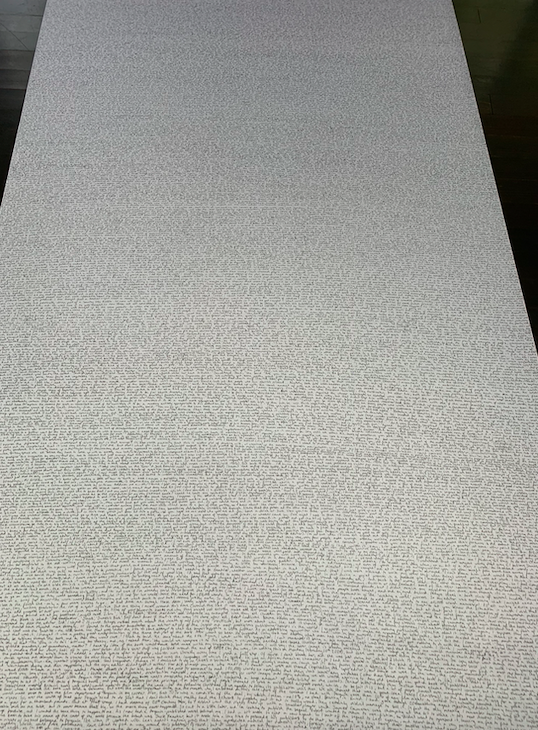
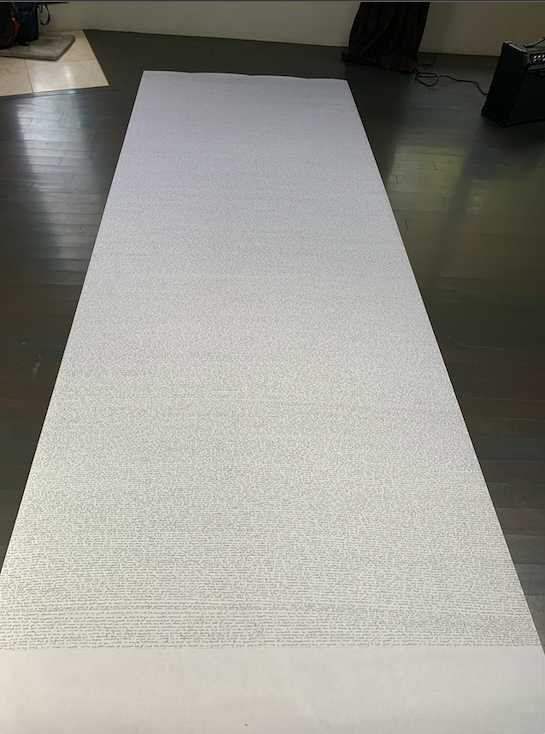
See? Kind of cool. Writing novels has given me a stoical perspective on writing lots of words, so I found the idea of 350,000 entirely doable.
When I tell people about this the first question tends to be, ‘What do you write about?’. Well, it’s a mixture of things. Most of it is the beginning of another book. I figured any novel would require several redrafts, so if I could work out a few plot and character points on here, I’d be good to go for a second draft on the computer. Otherwise I broke the fourth wall a lot and wrote about writing, or whatever was in the news, or whatever sprung to mind. It came out to about 1000 words an hour of brain-dump/novel/etc., and I soon upped my speed to 5 inches (down the page) per day, which was around 1500 words.
I had no idea what would happen to it. I thought a gallery might like it, although it would be impossible to hang or frame, so that might be problematic, but y’know, the Turbine Hall of Tate Modern might have the space. Would a gallery want it? That was the next question. I clearly have no name or standing as an artist, but is that what acceptance of ‘art’ is based on, and what is art anyway? It’s whatever the fuck I say it is, that’s what.
Then, in February, I remembered that Mark Denton had shown his work in the Royal Academy’s Summer Exhibition, which accepts submissions from professionals and first-timers alike. So I asked Mark about the process and he pointed me to the website. Luckily I was about two days away from the deadline, so I sent in the big piece as it stood (around 10ft x 4ft, or 40 square feet) and accidentally added another entry, so I also put in the canvas one shown above.
Long story short, the canvas one was shortlisted! That was pretty cool. There was some confusion on my part over which of the two pieces they’d chosen, but for whatever reason they liked the smaller one. Now I have to see if the exhibition is actually going ahead. You see, there’s this virus going around, and it’s shut all the art galleries. But I’ll happily take a shortlisting for what is literally my fifth deliberate piece of visual art.
So what I’m taking a very long time to say is that you can fill your time with all sorts of creative pursuits, even ones that aren’t your usual métier. If a non-artist like me can create something that gets shortlisted by the Royal Academy, you can probably set your dreams pretty high.
Use the time to add another quiver to your bow. You never know where it might lead, or what it might turn you into by the time this is all over. Make music with Garageband and Soundcloud; start a blog/novel/anthology of short stories on your Mac; create art out of your Amazon delivery boxes…
My current thing is stand-up comedy classes (they’ve moved online). This week is one-liners: There was a fire at the waxworks. Now they just have 73 versions of the Elephant Man.
Still got a way to go, but it feels good being on another journey.


